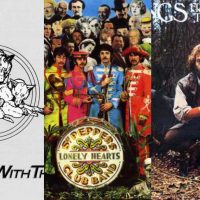For those who might not know the band’s backstory, British rockers Bad Company have their roots in an earlier band called Free. That late 1960s/early 1970s British rock group had achieved public acclaim based on its hit “All Right Now,” as well as critical success based on their solid catalog of six blues-rockin’ studio albums — and one live offering.
Unfortunately, personality clashes within the band and lead guitarist Paul Kossoff’s growing substance abuse problems forced Free to burn out. But from those ashes, drummer Simon Kirke and lead vocalist Paul Rodgers united with ex-Mott the Hoople guitarist Mick Ralphs and former King Crimson bassist Boz Burrell to form a new band, which they named Bad Company.
Bad Company was a meat-and-potatoes band whose stock in trade was simply written and tightly arranged mid-tempo song structures with functional, yet very tuneful, vocal lines united to straight-forward rock lyrics. Nothing too fast, too slow, too weird or too innovative. Really, they sounded a lot like many other bands from the same general musical era.
Still, they were more successful than most, and it didn’t hurt that they were signed to Led Zeppelin’s vanity label Swan Song, which gave them access to Zep’s management team. One of the first perks they got: when Zeppelin postponed some recording dates, they gave Bad Company their pre-booked studio time, which they used to make their first, self titled album.
We’re about to happily rearrange that one, along with Bad Company’s 1975 follow-up Straight Shooter, both of which are slated for vinyl reissue soon, adding brand-new titles for each …
Can’t Get Enough
Rock Steady
Ready For Love
Little Miss Fortune*
Don’t Let Me Down
Bad Company
Movin’ On
The Way I Choose
Superstar Woman*
Seagull
Bad Company was a good debut, with eight decent tracks. The only problem is that when your band writes a lot of mid-tempo material, it’s easy to confuse a slow-moving rock song with a ballad. So, even though there are at least three great rock tunes here (“Can’t Get Enough,” “Movin’ On,” and “Rock Steady”), most of the album sits on the fence and tries to decide whether to fall on the side of rockin’ or restin’.
Shuffling things around a bit and then adding B-side “Little Miss Fortune” and the previously unreleased “Superstar Woman” — both which magically resurfaced on the band’s 1999 box set — gives the entire album more of a rock sensibility, and less of a focus on its ballads.
And at the very least, it brings the original collection up and over it’s initial running time of a measly just under 35 minutes in total. Old rock fans who remember the old two-sided vinyl format will remember this: with a short record, by the time you dropped the needle, set your volume, and then set yourself down in your favorite chair for a nice listen, you’d have to get up right away to flip over the disk to the second side.
Good Lovin’ Gone Bad
Feel Like Makin’ Love
Smokin’ 45*
Shooting Star
Deal with the Preacher
Whiskey Bottle*
Easy On My Soul*
Wild Fire Woman
Since their first album was a blockbuster, Bad Company applied the same formula to their second effort, Straight Shooter. Despite the fact that this album was more obviously a rock album with more rock attitude and less ballad sensitivity, the material wasn’t quite so strong. This time, it’s not just a case of shuffling the running order and adding in a couple of extra tunes; it’s also about getting rid of some of the weaker cuts. Pulling out “Weep No More,” “Anna,” and “Call on Me” makes room for “Smokin’ 45,” “Whiskey Bottle,” and “Easy On My Soul” — one of Paul Rodgers’ carry overs from his tenure in Free. All of this makes the resulting new album better than it was before.
In retrospect, Bad Company’s subsequent releases sounded like the band had fallen into a rut. They could still rely on their polished studio craftsmanship, but they were applying it in a workmanlike way to some mostly uninspired material. Some reviewer wagged that they should have, in fact, released more albums back then before up-and-coming bands like Foreigner could steal all their material and beat them at their own game. In any case, it seems that the first two Bad Company albums were popular enough that they allowed the individual members some flexibility as far as pursuing different musical ideas in the future went — but that’s a different story for a different time.
- How David Bowie’s ‘The Next Day’ Stripped Away All of the Artifice - March 15, 2023
- Why Deep Purple’s ‘Who Do We Think We Are?’ Deserves Another Listen - January 11, 2023
- In Defense of the Often-Overlooked Mott the Hoople - November 10, 2022




